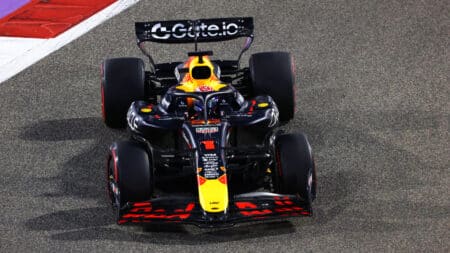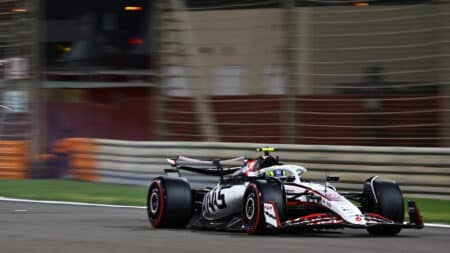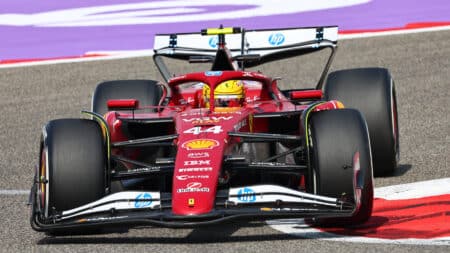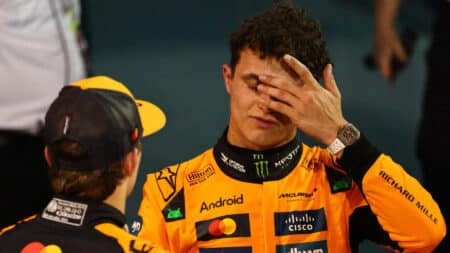
How 'everything went wrong' for Verstappen and Red Bull in Bahrain
A trying Bahrain GP has left Red Bull and Max Verstappen facing the reality that the titles may be slipping away
Taken from the July 1983 issue of Motor Sport
By Denis Jenkinson
At this length of time after the event there is little point in recording an hour-by-hour or lap-by-lap account of the happening on the return of Grand Prix racing to the revised Spa-Francorchamps circuit in the wooded hills in south-east Belgium. Suffice to say that everyone seemed to enjoy the event, a crowd of 80,000 turned up to watch, it was a real horsepower race and the character of the Grand Prix de Belgique as a great occasion has returned.

Alain Prost leads Eddie Cheever
For the record some brief notes will not go amiss. In spite of a few ‘dismal jimmies’ forecasting doom, practice got away promptly on Friday morning and it was noticeable how all the drivers were keen to get to grips with this challenging new circuit for Formula 1. The nature of the circuit brought out the best in them and Tambay, Laffite and Surer were a joy to watch anywhere for their sheer precision at high speed and their obvious delicate balance. Rosberg was good spectator value showing incredible determination and forceful driving and his speed came from a big heart rather than inborn skill and artistry. If he was as smooth and precise as his Williams team-mate he would be really quick; as it is there is no one with a Cosworth V8 that can touch him at the moment.
Young Andrea de Cesaris was brave and fast, especially on his entry to corners, but the most uncanny driver to watch is Alain Prost. There is no sign of effort, no obvious speed, no feeling of artistry, in fact a rather dull proposition to observe, yet he was by far the fastest driver on the circuit. There must be a lesson there somewhere. In the qualifying hour on Friday afternoon in warm and dry conditions the scene was set with all the factory turbo-charged 1.5-litres up at the front, the real tryers in the middle and the odds and ends down at the back. Notable was Marc Surer who got his Arrows A6 in between the two Williams drivers and Roberto Guerrero who got his Theodore ahead of the two McLaren drivers, Lauda and Watson. The first day ended with everything looking good.

Theodore’s Roberto Guerrero in Montreal, 1983
Saturday was a disaster. The clouds were on the ground on the higher parts of the surrounding area and the rain came. In spite of the awful conditions all the drivers were eager to get out on the circuit on treaded rain tyres, they had not enjoyed themselves at a circuit like this in a long time. It was most heartening to see. The rain continued throughout the day so all hope of anyone improving on their Friday qualifying time was gone. The times for Friday settled the grid position and it was no real surprise that the two non-qualifiers were Salazar with the RAM-March and Ghinzani with the Alfa Romeo V12 engined Osella.
Apart from Warwick being further down the grid than was reasonable, due to typical ‘Toleman Trouble’ and having to use the spare car, the Friday line-up was reasonable, so the fact that Saturday qualifying was a wash-out was not too serious. We have come to accept that neither McLaren driver tries too hard these days, for they don’t want to make it look as though the Cosworth DFY engine will keep them competitive through this season. They need to ram home the urgency of getting the new Porsche engine into racing as soon as possible and to try and force the internal political issue within McLaren International, between the various factions, notably the sponsors Marlboro and TAG and the Porsche engineers.

McLaren’s TAG turbo engine, which made its debut at Zandvoort
Sunday was grey and over-cast but mercifully the rain held off and conditions were good for racing. The half-hour warm-up period saw plenty of action as everyone tried to make up for the lost time on Saturday. The fashion started by Brabham last year, of starting the race with only 25 gallons of petrol in the tank and relatively soft tyres, and making a pit stop half-way through the race, has caught on. Apart from Brabham, the Williams team, ATS, Lotus, Renault, Ligier, Alfa Romeo, Ferrari and Toleman were all planning pit stops.
The race was due to start at 2.30 to run over 42 laps of the 6.949 kilometre circuit, but as the start was on the slight uphill stretch before La Source hairpin, where the new pits have been built, and the finish was on the downhill run past the old pits, you had to add 662 metres to the total of 42 x 6.949 to get the full race distance. At 2.00 all 26 cars left the pits and did a lap round to the starting grid and Arnoux (Ferrari), Rosberg (Williams), Laffite (Williams) and Boesel (Ligier) all went through the pitlane and round for another lap before taking up their positions on the grid. Shortly before 2.30 they all set off on their parade lap behind Alain Prost’s Renault and when they returned Surer was in trouble with the gearbox on his Arrows.
As the starter put the red light on marshals at the back of the grid were waving yellow flags to indicate that all was not in order so the red light went to flashing yellow, which meant ‘start cancelled’, but Prost and de Cesaris saw the red light go out and simply took off! Tambay saw the flashing yellow and backed right off as did everyone else, while Surer, Laffite and de Angelis were left on the grid with stalled engines. Black flags greeted de Cesaris and Prost as they set off on what they thought was the first lap and the whole field straggled round the circuit and back to the grid. Poor Surer, with a broken gearbox went into the pits and transferred to the spare Arrows and resigned himself to having to start from the pitlane after everyone had gone from the restart.
The rules state that in the event of an aborted start there will be no topping-up of petrol tanks on the grid, but the race will be shortened by one lap, to allow for a second parade lap before the restart. As all the competitors had inadvertently done a lap and would now have to do the second parade lap as well, the race distance was shortened by two laps, from 42 to 40 laps. During the time before the restart Renault and Ferrari mechanics were seen with churns of petrol though no one seems to have seen them actually topping-up their cars. However, there were various protests and subsequently Renault were fined $5000 for having refuelling churns on the starting grid, which is strictly against the rules.
The second parade lap was done without Surer, and the 25 cars lined up and this time all was well. Andrea de Cesaris went off like a rocket between Prost and Tambay and led away. It was turbocharged cars all the way, Alfa Romeo (de Cesaris), Renault (Prost), Ferrari (Tambay and Arnoux), Brabham-BMW (Piquet) and ATS-BMW (Winkelhock), then Rosberg and Laffite with the Williams-Cosworths, followed by Renault (Cheever), Alfa Romeo (Baldi), Lotus-Renault (de Angelis) with Guerrero leading the rest with his Theodore, ‘the rest’ including Lauda and Watson, Alboreto, Jarier and Mansell, so the young driver from Colombia was feeling justifiably pleased with himself.
That was the pattern of the race until near to half distance when the pitstops began. Alfa Romeo fumbled their stop and Renault did a perfect job so Prost took over the lead from de Cesaris thanks entirely due to his mechanics (I hope he paid them a good bonus from his prize money!). The Alfa Romeo challenge disappeared when the neat little V8 engine blew up, but de Cesaris had surprised everyone not only with his speed but the fact that he looked reasonably safe and did not look as though he was going to fly off the road.
As usual the Brabham team were masters of the pitstop art with their air jacks and fixed wheel nuts, and they helped Piquet into a strong third place, which became second when the Alfa Romeo blew up, while Tambay and Cheever were behind. In the opening stages Rosberg was hanging on to the turbo-charged cars with a tenacity that reminded one of Jean Behra in his Gordini days, but he was inevitably losing ground all the time. Arnoux overheated his tyres in the first part of the race by some rough driving, and lost ground on the smooth Mr Tambay, and after the pit stops his Ferrari engine blew up.
The second half of the race was a Prost benefit, as the Renault droned its impeccable way round the circuit, with no one to trouble him. In the closing stages Piquet’s Brabham had gearbox trouble and he could not use fifth gear, so gradually Tambay and Cheever drew closer. Some idea of the unpopularity of Bernie Ecclestone in Belgium could be gained from the cheering and waving that went on in the crowd when Tambay overtook the stricken Brabham and again when Cheever went by. It was very obvious that Brabham, Ecclestone, Piquet and BMW are not a popular confection with the Belgians.
The two Williams cars ran like clockwork throughout the race as did the two Toleman-Hart cars, Warwick’s only problem being a muddled pit stop needing him to make a second stop. He had led his little Italian team-mate at the time, but naturally the second stop put him back. On the very last lap Giacomelli had a spin, but kept the engine running and as he gathered it all up Warwick went by into seventh place. Of the others Watson was savaged by Jarier at the hairpin and both cars were bent, Lauda went out with engine failure as did Guerrero, while Winkelhock had the embarrassment of a rear wheel coming off his ATS, which spun him off into the catch fences. Patrese did not complete a lap as his BMW engine failed, and the young Belgian Thierry Boutsen making his Formula 1 debut retired at five laps with suspension breakage on his rent-a-drive Arrows A6.
The revitalised Spa-Francorchamps circuit is not totally finished, but the race was a huge success and all the Belgians have to do now is to take a leaf from the Italians and organise things to utilise both of their major circuits. The Grand Prix de Belgique at Spa-Francorchamps, and the Grote Prijs van Belgic, at Zolder and then we’ll all be happy.

A trying Bahrain GP has left Red Bull and Max Verstappen facing the reality that the titles may be slipping away

Oliver Bearman contributed to a great day for Haas in the Bahrain GP by finishing 10th from last on the grid. Here's how he did it

After struggling to get to grips with his Ferrari, Lewis Hamilton says moving towards Charles Leclerc's set-up made a difference in Bahrain

A second F1 win in three grands prix has made Oscar Piastri look like the stronger McLaren driver, as Lando Norris admitted he is struggling to find answers